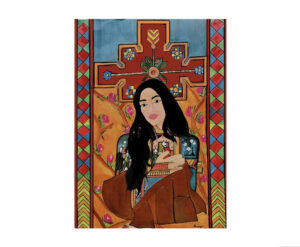Malu Halasa
Honor killings make international news, and invariably reinforce gender perceptions and violent stereotypes about the Middle East. However, men who justify violence against women by family members because of misplaced notions of respectability and virginity represent a problem that has not gone away. The lack of laws to punish perpetrators in the Arab/Muslim world only encourages more violence against female family members. Tragically, the murder of 22-year-old Iraqi YouTube star Tiba al-Ali by her father was a death foretold on social media.
https://www.youtube.com/watch?v=wc5ceI7IlQc&ab_channel=%D8%B7%D9%8A%D8%A8%D9%87%D8%A7%D9%84%D8%B9%D9%84%D9%8AThrough campaigns, protests, seminars and conferences, lawyers and activists from the NGO Isen Organization for Human Rights and Sustainable Development seek to change domestic violence laws in Iraq. Their Twitter feed recounted the events leading up to the influencer’s death, which was picked up by the world’s press.
In 2017 Tiba had gone to Istanbul on a family visit, and decided to stay there, after her brother sexually harassed her. She was 18 years old.
The life she made for herself took advantage of the opportunities afforded by new media. Photographs posted of herself on the internet showed a confident, attractive young woman. She had her own YouTube channel, with 18,000 subscribers with over 90,000 views. Her video-logs documented a busy life with her Syrian fiancé, Muhammad al-Shami.
In January, she returned to Iraq to support her country’s football team in the 25th Arabian Gulf Cup. Her posts on Instagram told of family threats against her on her arrival in Iraq. Still, she consented to meet her mother at a friend’s house in Baghdad. There, she found her family waiting for her. They took her by force from Baghdad to Diwaniyah Governorate, over a hundred miles away. She was asleep when her father strangled her. He turned himself in, and his excuse for the killing, as reported by local media, was “to wash away the shame.”
https://www.youtube.com/watch?v=NHM0gUnQEUw&ab_channel=%D8%B7%D9%8A%D8%A8%D9%87%D8%A7%D9%84%D8%B9%D9%84%D9%8AAccording to Dr. Saad Maan, head of relationships and media in the country’s Ministry of the Interior and Baghdad Operations, the police had been aware of the threats against her and attempts to mediate the situation between Tiba and her family had failed. His comments emerged two days after Tiba’s death, and they strongly suggested the Iraqi government was on the back foot. In this age of internet transparency, Maan was keen to absolve the Iraqi government of any blame, although the laws of the country openly support men and discriminate against women and girls.
The country’s Penal Code Article 41(1) states, “No crime is committed while exercising a legal right,” and this includes “punishment of a wife by her husband.” Offences that are committed with “with honorable motives,” listed in Article 128, can result in the lessening of a charge, or the dismissal of a penalty.
In addition, Article 41 of the Iraqi Constitution specifies that: “Iraqis are free in their commitment to their personal status according to their sects, beliefs or choices.” This means that varying interpretations of personal rights and freedoms are dependent on tribal and religious beliefs, which in some cases deny women equal rights in marriage and permit forced marriage.
These laws entitle men to “discipline women and girls if they do not conform to the social roles attributed to them … they safeguard family honor and dignity through their untarnished ‘reputations,’ linked to modesty and ‘virginity.’” So writes Taif Alhudary, an Iraq-focused research officer at LSE’s Conflict Research program, in her blog, “Iraqi Women Are Engaged in a Struggle for their Rights.”
Since 2019, the human rights NGO, Isen, repeatedly called for legislation to pass the Domestic Violence Protection Act. In 2021, Isen opposed a campaign which wanted to unfairly amend Section 57 of the Personal Status Act by taking custody of the child from the mother.
Perhaps Tiba’s greatest crime in the eyes of her family was her independence, at a time when some women in Iraq are not encouraged to seek lives and livelihoods outside strict family control. Normally, family disputes are settled in negotiations mediated by prominent men in the local community often from tribal or religious affiliations. The local police in Diwaniyah were aware of the threats against Tiba five days before her death. Yet, nothing was done.
Isen’s Twitter feed also tells the story of Zahraa Habib Saadoun, a university student from Wasit, who was studying dentistry. After a domestic dispute, her brother killed her, her mother and sister.
In a later Tweet, the organization asks, “Is the government serious to stop these crimes? Do you bear responsibility for the repeated murders of our oppressed girls? What do we need to do to get Parliament to pass the Protection from Domestic Violence Act? How can the legislative authority be pushed to amend the articles of the Penal Code that allow crimes to be committed under the ugliness of ‘washing away shame?’
“Your answers to these questions are important to us. Let us cooperate together to establish a clear map to reduce the killing of our oppressed and chained daughters.”
Their questions have not gone unnoticed. Ala Talabani, a Kurdish politician and head of the Patriotic Union of Kurdistan bloc in the Iraqi Parliament, wrote back: “Women in our societies are hostage to backward customs due to the absence of legal deterrents and government measures — which are currently not commensurate with the size of domestic violence crimes. Yes, to legislating the Anti-Domestic Violence Law.”


































































































































